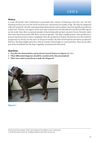 June 2024 in “Frontiers in immunology”
June 2024 in “Frontiers in immunology” Sequential therapy with dupilumab and baricitinib improved hair regrowth and atopic dermatitis in a child without adverse reactions.
 May 2024 in “Skin research and technology”
May 2024 in “Skin research and technology” Certain metabolites can either protect against or increase the risk of hair loss.
 April 2024 in “Histochemistry and cell biology”
April 2024 in “Histochemistry and cell biology” N-acetylcysteine may prevent hair loss caused by chemotherapy.
April 2024 in “Cosmetics” Wigs help improve self-esteem and quality of life for people with hair loss from alopecia areata.
March 2024 in “Nutrients” Alopecia Areata is linked to specific gut bacteria and metabolites, indicating a complex gut microbiome.
 March 2024 in “Skin research and technology”
March 2024 in “Skin research and technology” High CRP levels could indicate vitamin D deficiency in people with alopecia areata.
 February 2024 in “Clinical, Cosmetic and Investigational Dermatology”
February 2024 in “Clinical, Cosmetic and Investigational Dermatology” Certain fats in the blood are linked to an increased risk of male pattern baldness.
 December 2023 in “Journal of dermatology”
December 2023 in “Journal of dermatology” Adults and adolescents with severe alopecia areata are willing to take significant health risks for a better chance of hair regrowth.
 October 2023 in “International journal of research in Ayurveda and pharmacy”
October 2023 in “International journal of research in Ayurveda and pharmacy” Keedari thailam is effective for treating alopecia areata and has multiple health benefits.
 September 2023 in “Pharmaceuticals”
September 2023 in “Pharmaceuticals” Tiny particles improved delivery of hair loss treatments to hair follicles, with lipid-based particles performing best.
 September 2023 in “Medicina-lithuania”
September 2023 in “Medicina-lithuania” The study suggests that analyzing DNA can help treat hair loss, but more research is needed.
 September 2023 in “Biomedicines”
September 2023 in “Biomedicines” Squalene may be a marker for certain types of alopecia.
 July 2023 in “IntechOpen eBooks”
July 2023 in “IntechOpen eBooks” New treatments for alopecia areata show promise, but more research is needed to confirm their effectiveness.
 May 2023 in “Frontiers in Immunology”
May 2023 in “Frontiers in Immunology” Treg cell-based therapies might help treat hair loss from alopecia areata, but more research is needed to confirm safety and effectiveness.
 April 2023 in “Nigerian Journal of Clinical Practice”
April 2023 in “Nigerian Journal of Clinical Practice” Hair loss in adults is linked to heart disease risk factors like unhealthy blood fats, lack of exercise, and alcohol use. It's also slightly more common in people with metabolic syndrome. As people age, hair loss gets worse. In men, severe hair loss is tied to high blood pressure and a larger waist. In women, it's tied to higher body weight. People with hair loss should be checked for unhealthy blood fats and advised to avoid alcohol and inactivity.
 August 2020 in “Pakistan Journal of Zoology”
August 2020 in “Pakistan Journal of Zoology” A new mutation in the Hairless gene causes hair loss in two Pakistani families.
 January 2020 in “Archives of Medicine and Health Sciences”
January 2020 in “Archives of Medicine and Health Sciences” Certain immune molecules and stress affect hair loss, and while genes play a role, more research is needed to fully understand and treat it.
November 2019 in “BMC veterinary research” The hair loss in Belgian Blue crossbred calves was caused by a diet issue, not by disease or infection.
 May 2019 in “Small Animal Dermatology”
May 2019 in “Small Animal Dermatology” The dog has Color Dilution Alopecia, causing hair loss and increased risk of skin infections.
 June 2014 in “British Journal of Dermatology”
June 2014 in “British Journal of Dermatology” Eczema patients have a lower skin lipid to protein ratio, older and longer-staying hospital patients are more likely to get pressure ulcers, hair loss in AGA is linked to muscle degeneration, vitamin D deficiency is common in alopecia areata and linked to its severity, standard liver tests don't effectively detect fibrosis in psoriasis patients on methotrexate, and bullous pemphigoid patients have a higher death risk but combination therapy may reduce it.
 June 1997 in “Australasian Journal of Dermatology”
June 1997 in “Australasian Journal of Dermatology” Researchers found new hair and nail genes, how hair reacts to UV, differences in white and pigmented hair growth, nerve changes in alopecia, treatments for baldness and alopecia, a toenail condition linked to a genetic disorder, and that nail fungus is more common in people with psoriasis.
 May 2024 in “Deleted Journal”
May 2024 in “Deleted Journal” Cancer treatments can cause hair loss, but it is often reversible and can be managed with scalp cooling and support.
 January 2023 in “International Journal of Contemporary Pediatrics”
January 2023 in “International Journal of Contemporary Pediatrics” A rare genetic disease causes rickets and often hair loss in young children, which can improve with specific treatments.
 July 2022 in “International Journal of Contemporary Pediatrics”
July 2022 in “International Journal of Contemporary Pediatrics” Two siblings with a rare type of rickets and hair loss had low vitamin D levels, which is not typical for their condition.
December 2022 in “Plastic and Reconstructive Surgery” PRP is an effective and safe treatment for hair loss.
November 2022 in “International Journal of Applied Pharmaceutics” Ergostadienol from Moringa seed oil may help prevent hair loss.
 July 2022 in “Nigerian journal of medicine : journal of the National Association of Resident Doctors of Nigeria”
July 2022 in “Nigerian journal of medicine : journal of the National Association of Resident Doctors of Nigeria” Androgenetic Alopecia (AGA) greatly lowers quality of life, causing stress and low self-esteem, with those seeking treatment experiencing more impairment.
 January 2022 in “Experimental Dermatology”
January 2022 in “Experimental Dermatology” Minoxidil solution and foam both increase hair growth, but the solution works better than the foam.
 119 citations,
May 2020 in “Journal of The American Academy of Dermatology”
119 citations,
May 2020 in “Journal of The American Academy of Dermatology” Most COVID-19 patients in hospitals have androgenetic alopecia, more in men, suggesting a link between androgen sensitivity and severe COVID-19 symptoms.























